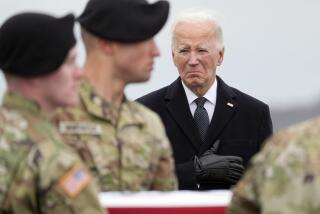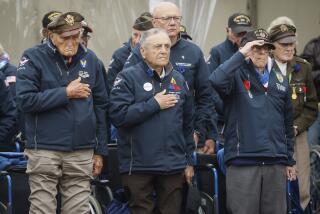Soldiers Hail the Battle Cry: ‘We’re Part of Something’ : Action: Members of one troop division express relief that the long wait is over and the fighting has begun.
- Share via
WITH THE 82ND AIRBORNE DIVISION — Sgt. Michael Senter spoke for a lot of the soldiers in the Army’s 82nd Airborne Division, the first ground troops to arrive in Saudi Arabia, when he said, “It’s about time.”
Senter, 24, of San Antonio, ate breakfast with his buddies from the Air Defense Artillery unit and talked about Operation Desert Storm.
“After 5 1/2 months, there’s a sense of relief. We’re part of something that’s going to be in the history books,” Senter said.
As the allied air forces opened the war against Iraq, the ground soldiers clustered around their cots to hear the news on portable radios. Some ate breakfast as they listened.
“It had to start to come to an end,” said Pfc. William Weaver, 20, of Cherry Hill, N.J., who was on KP duty. “Now you can see an end.”
“This is how the big boys play,” said Col. Keith Kellogg, chief of staff for the 82nd Airborne, when asked about America’s strike capability. “If you’re going to piss on a tree, you better be a pretty big dog.”
At 10 p.m. Wednesday, five hours before the first U.S. air strikes were announced, soldiers got a harbinger of things to come when they were given the order to start taking their nerve agent pretreatment tablets. Reporters in the combat pool took theirs too.
The division was under orders to carry gas masks and chemical suits at all times.
When told that Saddam Hussein had promised to fight “the mother of all battles,” Chief Warrant Officer Jim Keesee, 39, of York, Pa., replied: “Tell him Dad’s coming to kick his Mom’s butt.”
Although the soldiers were excited by the start of conflict, Staff Sgt. Henry Rouse, 40, of Waynesboro, Ga., also said the war of nerves since Iraq seized Kuwait on Aug. 2 had taken its toll.
“It’s like standing up to a childhood bully. You avoid it as much as you can, then you’re glad it’s over with,” Rouse said. “That was just the first punch. Now we dance. . . . The wait, wait, wait has stopped.”
Members of the 118th Military Police Co., who wear American flags on their right sleeves, reacted with vigor.
“That’s one step closer to going home. Now we can start counting the days till we’re home,” said Sgt. James Porter, 30, of Cherryville, N.C.
“He blew it. He’s ours,” said Spec. 4 Janet Moore of Many, La., one of about a dozen women MPs in the company.
“I’d like to say something to those protesters back home,” she added. “We’re here for a good reason. Americans shouldn’t be fighting each other. We’re here to fight Iraqis. I don’t want to die. But we’re here to do our jobs.”
One soldier listening to a portable radio gave a “thumbs up” at the news of the bombing. A paratrooper going through the chow line said, “I woke up this morning with a smile on my face.”
Maj. Baxter Ennis, the division spokesman, woke reporters at about 5 a.m. local time just as President Bush was speaking to the American people. It was a sober moment, a realization that war is a reality.
“It’s almost a relief the dam has finally burst after more than 160 days in the country,” said Ennis, 38, of Coats, N.C.
“We’re not naive enough to think it’s all going to be over quickly. If it comes to a ground war, it could be very costly. We hope and pray the air war will succeed,” Ennis said.
“Americans want war the least of anybody in the world. We realize this thing may not be over for a long time at a great cost of life,” he said.
“There’s a glimmer of light at the end of the tunnel. Before, it was just a question mark, an open-ended calendar.”
More to Read
Sign up for Essential California
The most important California stories and recommendations in your inbox every morning.
You may occasionally receive promotional content from the Los Angeles Times.










